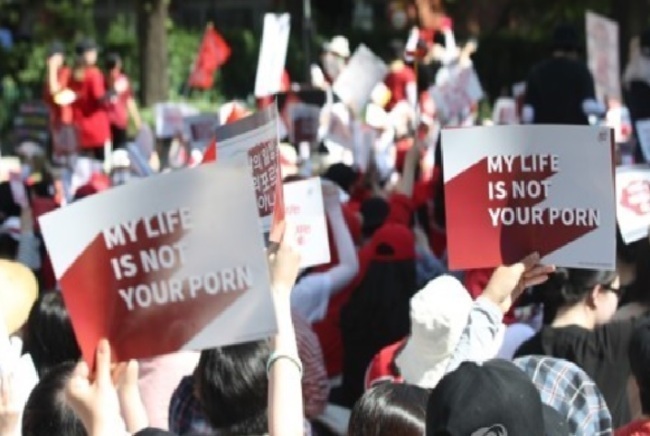Some 16,802 Koreans were arrested for spy-cam-related crimes over the last four years, and 97 percent, or 16,375, of the suspects were male, a lawmaker’s office revealed on Wednesday.
According to Rep. Lee Jae-jung of the ruling Democratic Party, among the male suspects, 15.7 percent were known to their alleged victims, often as neighbors or work colleagues.
The biggest proportion of the suspects who had known the victims before committing the crime turned out to be the women victims‘ ex-romantic partners, the lawmaker added.
 |
Women protesters hold a sign that says, "My life is not your porn," during a mass women`s rights rally condemning South Korea`s rampant spy-cam crimes. (Yonhap) |
Last month, some 70,000 women protesters marched in central Seoul to demand the government come up with more measures to protect women against cyber sexual violence, carrying signs that read “my life is not your porn.”
It took the Korean government some 10 years to shut down SoraNet, a now-defunct, illegal file sharing site known for its rampant circulation of spy-cam porn, only after concerns and protests surged against its content by women’s rights activists.
The site is known as one of the very first internet sites that have led to the rampant online circulation of revenge porn and spy-cam porn in today’s South Korea.
From 1999-2016, the site had attracted some one million members, mostly male, many of whom secretly produced and posted sexually explicit video footage of their ex-romantic partners and other women.
Many of such footage were filmed in public bathrooms and changing rooms, among other locations, using hidden cameras without the victims’ consent.
Earlier this month, the government said it was stepping up efforts to tackle the ongoing spy-cam porn crisis, including carrying out daily inspections of public bathrooms, among other measures.
(
dyc@heraldcorp.com)








![[Today’s K-pop] Blackpink’s Jennie, Lisa invited to Coachella as solo acts](http://res.heraldm.com/phpwas/restmb_idxmake.php?idx=644&simg=/content/image/2024/11/21/20241121050099_0.jpg)